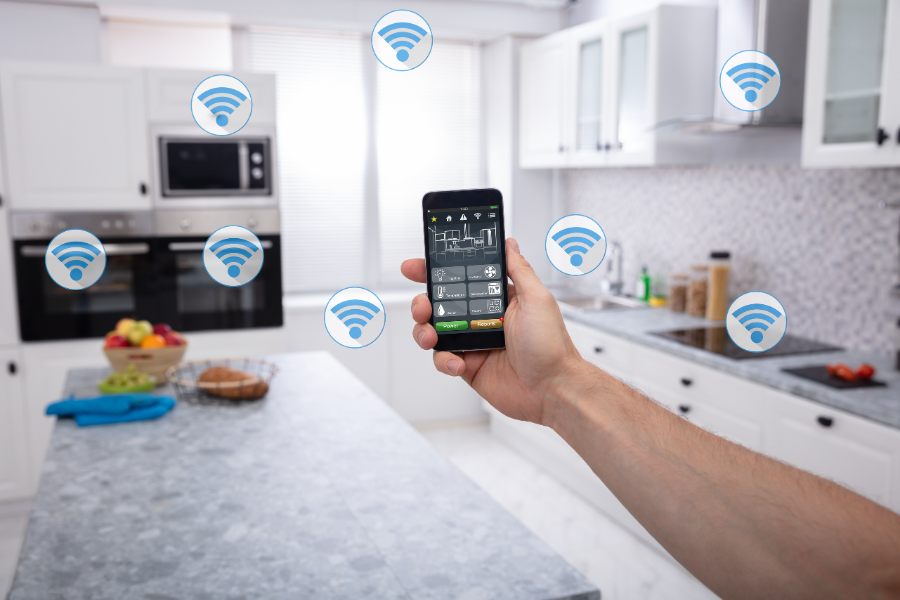
Designing Smart Homes with AI: Innovating Future Living Spaces
As technology continues to evolve, the concept of designing smart homes with AI has become a reality. In the not-so-distant past, the idea of a home that could anticipate and respond to our every need seemed like science fiction. Today, however, smart homes are transforming the way we live, offering convenience, efficiency, and enhanced security.
The integration of artificial intelligence into home design is not just a trend; it’s a revolution that is reshaping our living environments. With AI, homes are becoming more intuitive and responsive, providing a seamless living experience that adapts to our lifestyles.

Understanding Smart Homes
Smart homes utilize a network of interconnected devices that communicate with each other to automate and enhance various household functions. These functions include lighting, heating, security, entertainment, and more. The core of a smart home is its ability to be controlled remotely and to learn from the habits and preferences of its inhabitants.
The Role of AI in Smart Homes
Artificial intelligence plays a crucial role in the operation of smart homes. AI systems can analyze data from various sensors and devices to make informed decisions. For instance, an AI-powered thermostat can learn your temperature preferences and adjust accordingly, ensuring optimal comfort while saving energy.
Moreover, AI can enhance the security of smart homes. By analyzing patterns and detecting anomalies, AI systems can alert homeowners of potential threats and even take preventive measures automatically.
Benefits of Designing Smart Homes with AI
The benefits of integrating AI into home design are numerous. One of the most significant advantages is the increased energy efficiency. Smart homes can monitor and manage energy usage, reducing waste and lowering utility bills. Additionally, AI can help create a healthier living environment by optimizing ventilation and air quality.
Another benefit is convenience. With AI, mundane tasks such as adjusting the thermostat, turning off lights, or locking doors can be automated, freeing up time for more important activities. Furthermore, AI enables personalization, allowing homes to adapt to the unique needs and preferences of each resident.
Challenges in Implementing AI in Smart Homes
While the potential of AI in smart homes is immense, there are challenges to overcome. Privacy and security are major concerns, as smart homes rely on constant data collection and analysis. Ensuring that this data is protected and used ethically is crucial.
Additionally, the initial cost of setting up a smart home can be high. However, as technology advances and becomes more accessible, these costs are expected to decrease, making smart homes a viable option for more people.
Future of Smart Homes with AI
The future of smart homes is promising, with AI at the forefront of innovation. As AI technology continues to evolve, we can expect even more advanced and intuitive smart home systems. These systems will not only enhance our comfort and convenience but also contribute to a more sustainable and efficient future.
One area of development is the integration of AI with smart home sensors, which can provide real-time data for enhanced decision-making. Additionally, AI is expected to play a role in improving voice command privacy, addressing concerns about data security.
AI-Powered Appliances
Many modern appliances are now equipped with AI capabilities, allowing them to communicate with other devices in the home. This integration facilitates seamless operation and enhances the overall functionality of the home. For example, an AI-powered refrigerator can suggest recipes based on the ingredients available, while a smart oven can adjust cooking times and temperatures autonomously.
Smart Home Ecosystems
The concept of a smart home extends beyond individual devices. It encompasses an entire ecosystem of interconnected technologies working together to create a cohesive living environment. This ecosystem includes everything from AI-driven appliances to integrated smart hubs that centralize control.
Moreover, the integration of external smart home solutions is becoming more prevalent, offering homeowners a wide range of options to tailor their smart home experience.
Environmental Impact
Designing smart homes with AI can significantly impact the environment. By optimizing energy usage and reducing waste, smart homes contribute to sustainability efforts. Additionally, AI can assist in the efficient management of resources, such as water and electricity, further promoting eco-friendly living.
Conclusion
The integration of AI into home design is revolutionizing the way we live. By creating intelligent, responsive environments, smart homes offer unparalleled convenience, efficiency, and security. As technology continues to advance, the possibilities for designing smart homes with AI are limitless, paving the way for a brighter and more sustainable future.

FAQ
What are the benefits of AI in smart homes?
AI in smart homes offers numerous benefits, including increased energy efficiency, enhanced security, convenience, and personalized living environments. These systems can optimize energy usage, monitor security, automate tasks, and adapt to individual preferences.
What are the challenges of implementing AI in smart homes?
Challenges include privacy and security concerns, as smart homes rely on constant data collection. Ensuring data protection and ethical use is crucial. Additionally, the initial cost of setting up a smart home can be high, though this is expected to decrease over time.
How does AI impact the environment in smart homes?
AI can significantly impact the environment by optimizing energy usage and reducing waste. Smart homes contribute to sustainability efforts by efficiently managing resources like water and electricity, promoting eco-friendly living.
This article contains affiliate links. We may earn a commission at no extra cost to you.